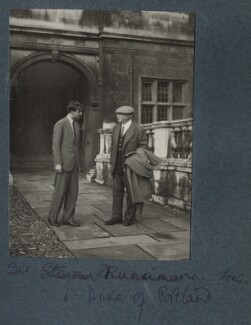
Sir James Cochran Stevenson Runciman CHFBA, (known as Steven Runciman) born 7 July 1903, was an English historian best known for his three-volume A History of the Crusades. His three-volume history has had a profound impact on common conceptions of the Crusades, primarily portraying the Crusaders negatively and the Muslims favourably.
Born in Northumberland, he was the second son of Walter Runciman, 1st Viscount Runciman of Doxford, and Hilda Runciman, Viscountess Runciman of Doxford. Both of his parents were or became members of parliament for the Liberal Party, and were the first married couple to sit simultaneously in Parliament. Below is a clip from British Pathé where Lord Walter Runciman is arriving in Prague by train, accompanied by Lady Runciman, to try to solve the differences between the Czechoslovaks and the Sudetan Germans.
It was said that he was reading Latin and Greek by the age of five. In the course of his long life he would master an astonishing number of languages, so that, for example, when writing about the Middle East, he relied not only on accounts in Latin and Greek and the Western vernaculars, but consulted Arabic, Turkish, Persian, Hebrew, Syriac, Armenian and Georgian sources as well. A King's Scholar at Eton College, he was an exact contemporary and close friend of George Orwell. While there, they both studied French under Aldous Huxley.
In 1921 he entered Trinity College, Cambridge, as a history scholar and studied under J.B. Bury, becoming, as Runciman later said, falsely, "his first, and only, student". At first the reclusive Bury tried to brush him off; then, when Runciman mentioned that he could read Russian, Bury gave him a stack of Bulgarian articles to edit, and so their relationship began. It was said that he was always looking out for the ghost of Byron’s pet bear in the quads of Trinity College Cambridge at night. Known for his viper tongue and pet parakeet, his obsession with the Byzantines grew at Cambridge. His work on the Byzantine Empire earned him a fellowship at Trinity in 1927.

He would become a dining partner of John Maynard Keynes and Sergei Diaghilev and a beloved teatime companion of the Queen Mother. When Runciman became a junior fellow of Trinity, his colleagues included Anthony Blunt, and Guy Burgess was one of his favoured pupils.
In his personal life, Runciman was an old-fashioned English eccentric, known, among other things, as an aesthete, raconteur, and enthusiast of the occult. According to Andrew Robinson, a history teacher at Eton:
"He played piano duets with the last Emperor of China, told tarot cards for King Fuad of Egypt, narrowly missed being blown up by the Germans in the Pera Palace hotel in Istanbul and twice hit the jackpot on slot machines in Las Vegas".

After receiving a large inheritance from his grandfather, Runciman resigned his fellowship in 1938 and began travelling widely. Thus, for much of his life he was an independent scholar, living on private means.
He went on to be a press attache at the British Legation in the Bulgarian capital, Sofia, in 1940 (on Guy Burgess’s recommendation) and at the British Embassy in Cairo in 1941. From 1942 to 1945 he was Professor of Byzantine Art and History at Istanbul University, in Turkey, where he began the research on the Crusades which would lead to his best known work, the History of the Crusades. From 1945 to 1947 he was a representative in Athens of the British Council. He was elected a Fellow of the British Academy in 1957 and was knighted in the 1958 New Years Honours List.

Most of Runciman's historical works deal with Byzantium and her medieval neighbours between Sicily and Syria; one exception is The White Rajahs, published in 1960, which tells the story of Sarawak, an independent state founded on the northern coast of Borneo in 1841 by James Brooke, and ruled by the Brooke family for more than a century.
Runciman held sympathies toward the Byzantine Empire and blamed the Crusaders, whom he considered "intolerant barbarians", for causing the downfall of Constantinople in the Fourth Crusade. Less than a decade after the Second World War ended, Runciman called the Fourth Crusade the greatest crime committed against humanity.

There is little evidence of a long-term lover but Runciman boasted of a number of casual sexual encounters - telling a friend in later life: "I have the temperament of a harlot, and so am free of emotional complications." Nevertheless Runciman was discreet about his homosexuality, partly perhaps because of religious feelings that homosexuality was "an inarguable offence against God". Runciman also felt that his sexuality had potentially held back his career. Max Mallowan, archaeologist (and husband of Agatha Christie) related a conversation where Runciman told him "that he felt his life had been a failure because of his gayness".

In 1984 Runciman was appointed a Companion of Honour. Streets in Mystras, Greece and Sofia, Bulgaria were named in his honour. Runciman was reluctant to be biographised, though not because he thought his own life was without interest: he had a rich stock of anecdotes, some of them quite self-regarding, and was happy to publish many of them in his 1991 book of memoirs, A Traveller’s Alphabet.
The reluctance stemmed from his fear that younger biographers would, as he put it, be “insensitive to the atmosphere of the past and unaware of that transient element, it's humour”.
A one-time Laird (Lord) of Eigg, one of the Small Isles in the Scottish Inner Hebrides, he had a life-long romance with Scotland which saw him live out his last decades in a Dumfries tower house. He lived in Eigg Lodge, designed by Robert Mauchlen of Mauchlen & Weightman in collaboration with Sir Walter Runciman. Built from 1926-1927 it was a Colonial style villa. Behind the handsome Italianate frontispiece, the house is very narrow in plan. The semi-tropical garden was largely the creation of Steven Runciman in the 1930s, and was a testament to the island's remarkable Gulf Stream microclimate. Here, flame trees, palm trees, horse chestnuts, azaleas, euchryphias and eucalyptus trees flourish, in lush contrast to the wild moor above.
He died in Radway, Warwickshire, while visiting relatives, aged 97. Earlier the same year, he had made a final visit to Mount Athos to witness the blessing of the Protaton Tower at Karyes (the capital of the monastic community), which had been refurbished thanks to a gift from him.

Below is an episode from a 2010 culture and literature series called 'Off The Page' which featured a different Scottish writer each week. In this episode Sir Steven Runciman remembers his childhood as the son of a Cabinet Minister with aspirations to be a thief, his many travels, and his joy in keeping a diary.
Reading Recommendations & Content Considerations
The Byzantine Life of Steven Runciman by
Minoo Dinshaw Steven Runciman































Comments